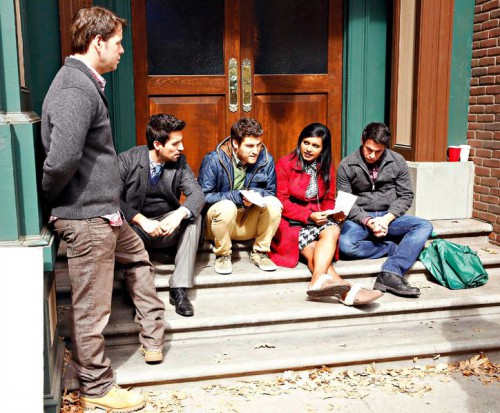
I remember the high school Bible studies of my Deep South upbringing would often remind students to be wary of whom they befriended. They told students that they should keep a good distance from people who chose to smoke behind the gym (me) or make out in the teacher’s lounge (also me) because as St. Paul reminds us, “Bad company corrupts good character.”
Retrospectively, it’s totally okay. I showed up at one of those Bible studies and asked a lot of questions. Everyone, including me, was okay with me not coming again. And so my friends were mostly theatre kids as they had no issues with nicotine and necking.
And then I got to seminary and learned an entirely new theory of looking at friendship. I learned that we should befriend the social outcasts in our midst. Do as Jesus had done. Spend time with the prostitutes and widows. I at least gave this a fair shot. As I was commuting, attending seminary, and being pregnant, I did not have loads of time to seek out prostitutes for friendship. I managed to give a meager amount of money to a ministry that did. That certainly didn’t feel like friendship, though it did help me to feel good about myself. Thanks to my church membership, I knew plenty of widows. And while they were all lovely women, they were in a different season of life. None of them were interested in talking about The Mindy Project with me or lamenting morning sickness. Which is currently how I choose friends.
And so I sort of gave up on having friends that matched Biblical edicts. I was too tired to pat myself on the back for following the Christian guidelines for relationship. And then, last week, one of my buddies died. And then I realized that a Christian friendship is not as riddled with parameters as we want it to be.
My friend was an elderly Scottish monk named Andrew. I went to him for spiritual direction during seminary. We stayed in touch here and there. My husband and I would show up every month or so to hang out at the monastery (it’s more fun than it sounds). All along I had been thinking that my regular spiritual direction with Brother Andrew was me doing some sort of due diligence. As someone heading towards ordination I knew I should be seeking spiritual counsel. But in the days following Andrew’s death, I have come to believe that our relationship was no mere checking of a box. Instead, I believe it was precisely what God intended for friendship.
Now before you assume that we sat around chanting the psalms together, let me make one thing clear: our conversations could have happened at a bar stool as easily as they happened at a monastery. His language was salty. His honesty unwavering. And his love for me undeniable. I can remember walking down the hallway after our chats to meet my husband. Each time I would walk towards my husband Brother Andrew would say to him, “She’s wonderful. You’re so lucky to have her.” It was like being given away in marriage from the proudest father you could imagine.
Our talks were never a one way encounter. Brother Andrew would willingly share the struggles he was dealing with as he aged. He spoke about his own skirmishes in religion and relationships. And when I spoke, Brother Andrew offered me the kind of open-hearted grace that I find exceedingly rare.
One of our favorite topics was parenthood. When I started seeing Andrew I was pregnant with our son. And so we visited with one another well into my son’s toddlerhood. We talked about the profound love that a child calls us into. Love that is unimaginably exposed in the form of a tiny baby. In one of our early meetings one of us remarked: Having a child is like your heart walking around outside of your body.
Now, it’s a piece of wisdom I’ve heard before and it has always resonated. But the strange thing about this statement is that neither of us could remember if it was him or me that said it. I remembered him saying it me. And he remembered me saying it to him.
Perhaps our interpretations of Christian friendship are misplaced. Maybe, like most relationships in life, we cannot hold our friends to a checklist of criteria. Often churches want to use words like “accountability” for Christian friendships. As though the highest iteration of our friendship would be to hold one another to a certain moral code. Or perhaps, we have been told that we should seek out friends who are not like us, that we should befriend those who are on the margins of society. This is a well-meaning suggestion, as long as those people are okay with meeting our need to feel munificent and patronizing about friendship.
In the wake of Brother Andrew’s death I have come to wonder: Maybe the best kinds of friendships are simply two sinners gently prodding one another to remember God’s grace. Maybe Christian friendship happens when we can’t figure out who is being benevolent to whom.

COMMENTS
Leave a Reply














